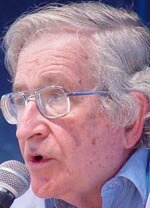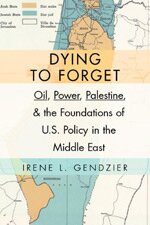When civilizations start to die they go insane. Let the ice sheets in the Arctic melt. Let the temperatures rise. Let the air, soil and water be poisoned. Let the forests die. Let the seas be emptied of life. Let one useless war after another be waged. Let the masses be thrust into extreme poverty and left without jobs while the elites, drunk on hedonism, accumulate vast fortunes through exploitation, speculation, fraud and theft. Reality, at the end, gets unplugged.
IOA Editor: Although not focusing on the Israeli occupation, this exceptional commentary explains US history and global behavior, very much including the Middle East.
In the name of [“Never again to us, the Jews”], they end up denying the humanity of the victims of Israel, the purported “State of the Jews”, just as most oppressors throughout history have denied their victims’ humanity.
The Simon Wiesenthal Center is planning to build a Museum of Tolerance on the Muslim Mamilla cemetery. This project is a grotesque attempt to erase the well-established history of a continuous Muslim presence in the city that dates back over a millennium… There is no justification for these desecrations. If they were occurring in any other place on earth, the outcry would be deafening. Unfortunately, the treatment of Mamilla is not an anomaly; Muslim and Christian sites of cultural, religious and historical significance continue to be systematically disrespected by Israeli authorities. The Protection of Holy Sites Law in Israel now covers 137 sites. Not one of these is Christian or Muslim.
Benny Morris: “Of course. Ben-Gurion was a transferist. He understood that there could be no Jewish state with a large and hostile Arab minority in its midst… There are circumstances in history that justify ethnic cleansing… A Jewish state would not have come into being without the uprooting of 700,000 Palestinians…There was no choice but to expel that population. It was necessary to cleanse the hinterland and cleanse the border areas and cleanse the main roads. It was necessary to cleanse the villages.”
Victoria Brittain: “This collection of Moshé Machover’s writings from the mid-1960s to today brings together a coherent and consistent vision of Zionist colonialism and the dispossession and discrimination which have been its hallmarks throughout the whole period. [A] valuable book in its historical reach, accessible style, and forthright debunking of the ‘peace process’ and other lazy myths…”
References to Israeli soldiers murdering Egyptian prisoners of war, although never officially acknowledged by Israel, can be found in a variety of sources. This case is interesting because it provides details on a discussion with the young General Ariel Sharon, a senior commander during the the 1956 Sinai War. Sharon lies about both the cause and the timing of the murder of Egyptian war prisoners.
In late 2011, the self-appointed media watchdog CAMERA informed the Journal of Palestine Studies of an incorrect citation in an article by Ilan Pappé referring to a quotation by Israeli founding father David Ben-Gurion which supports the expulsion (“transfer”) of Arabs from Palestine. Rashid Khalidi discusses the case, its implications and historical context.
IOA Editor: Finkelstein’s treatment of Palestinian rights reflects the limitations of relying exclusively on international law in the defense of Palestinian rights. Rather than forcing 100 years of history and a national liberation struggle into a legal brief, Finkelstein will do well to reconsider the implications of his focus on the “destruction of Israel” — a regional nuclear superpower — presumably by BDS activists, rather than focusing on 1948 Palestinian refugee rights and those of Palestinian citizens of Israel. As he must know, most Palestinians do not compartmentalize their national history as he appears to be doing.
In recent years, the government has adopted the so-called Prawer Plan, reversing several earlier decisions to recognize unrecognized Bedouin villages in the Negev desert. The new plan, explained by Association for Civil Rights in Israel lawyer Rawia Abu Rabia, will relocate 40,000 Bedouins in southern Israel for the establishment of 10 Jewish villages in their place.
For over 50 years, Fouzi El-Asmar has been one of the most important public intellectuals of the Palestinian liberation struggle. He is most well-known as the author of the landmark autobiographical work, To Be an Arab in Israel (1975), published in seven languages including Arabic and Hebrew, and as a prolific journalist specializing in the Palestinian-Israeli conflict with particular focus on matters of concern to Palestinian citizens of Israel.
We managed to delete Mount Hermon’s original, Syrian name as if it had never existed. Precious few Israelis have ever heard the name, or are aware of the 200 towns and villages that were obliterated in the Golan Heights. Most Israelis, we might assume, aren’t aware that they were ever there, since Israeli collective consciousness also erased the existence of their 120,000 residents – refugees that no one knows or cares about.
Ben White: I hope that this book can be a useful resource for university students and also for human rights and solidarity activists who seek a better grasp of Israel’s discriminatory policies towards Palestinian citizens. But I also would like this to be read by those people who have an interest in the issue or region as a whole, as well as those who have never had a chance to seriously unpack the implications of Israel’s definition as a “Jewish and democratic” state. There are insights here, I believe, that are crucial for an approach to the conflict that realistically appreciate what it will take to reach a settlement.
Rashid Khalidi: ‘This book is the most comprehensive and penetrating analysis available of the catastrophe that befell Arab Palestine and its people in 1948, known as the nakba. It shows how the expulsion and physical obliteration of the material traces of a people was followed by what Masalha calls ‘memoricide': the effacement of their history, their archives, and their place-names, and a denial that they had ever existed.’
Herein lies the Zionist left’s main international success: namely the framing of the conflict as being about war and peace between two equal parties, ‘two peoples who fight for the same territory’, rather than that involving colonisers and colonised… Included in this success is also the spreading of the idea of a conflict starting in 1967, with its fictitious semantic differentiation between ‘Israel proper’ and the ‘occupied territories’. These premises have for years succeeded in banishing the Israel-Palestine conflict to a completely different moral universe than other conflicts like Algeria, Vietnam or South Africa under apartheid.
The Road to Tantura is a gripping documentary film that follows a Los Angeles woman as she delves into the history of her family’s past. In 1948, her family was ripped from their homeland of Palestine, forced into refugee camps in Syria, and years later landed as immigrants in Ann Arbor, Michigan. By telling the story of one woman’s journey to her family’s past, this documentary offers a microcosm of the collective Palestinian experience that has been kept buried along with those who perished in Tantura that fateful day in 1948.
IOA Editor: For over 50 years, Tantura has been one of Israel’s most popular beaches; few Israeli-Jews are aware of its history.
Israeli protests in 2011 looked at first as if they constituted another link in the chain of militant uprisings sweeping the world in 2011. It seemed that the rage and indignation were directed against the disastrous doings of capitalist neo-liberalism which resulted in a vast enrichment of a very small elite, along with a drastic deterioration in living conditions and increased poverty. However, the nature of Israel as a settler-colonial state in which neo-liberalism and privatization were supported by Labor and the General Federation of the Workers determined the decisively different character and development of last summer’s protest.
In this wide-ranging interview, Rashid Khalidi has some harsh words for President Barack Obama, describing his UN speech in September as the worst ever by an American president. Khalidi also reviews the way in which US policy toward the conflict was transformed over decades, and discusses why AIPAC (the American Israel Public Affairs Committee) is far more effective today than it was in the 1970s and 1980s. Although he sees no hope at present for a just US policy, this could change if public opinion – which is much more enlightened than that of U.S. policy makers – is expressed through the media and at the political level.
Salim Tamari discusses his recent book, Year of the Locust: A Soldier’s Diary and the Erasure of Palestine’s Ottoman Past, and puts it in today’s geopolitical context.
False Prophets of Peace refutes the long held view of the Israeli left as adhering to a humanistic, democratic and even socialist tradition, attributed to the historic Zionist Labor movement. Through a critical analysis of the prevailing discourse of Zionist intellectuals and activists on the Jewish-democratic state, it uncovers the Zionist left’s central role in laying the foundation of the colonial settler state of Israel, in articulating its hegemonic ideology and in legitimizing, whether explicitly or implicitly, the apartheid treatment of Palestinians both inside Israel and in the 1967 occupied territories.
Start with fragmentation. When talking about Israel refer to a mythical state that existed between November 1966 and June 1967, the only period during which the majority of Palestinians living under Israeli control were NOT subject to military rule.
























